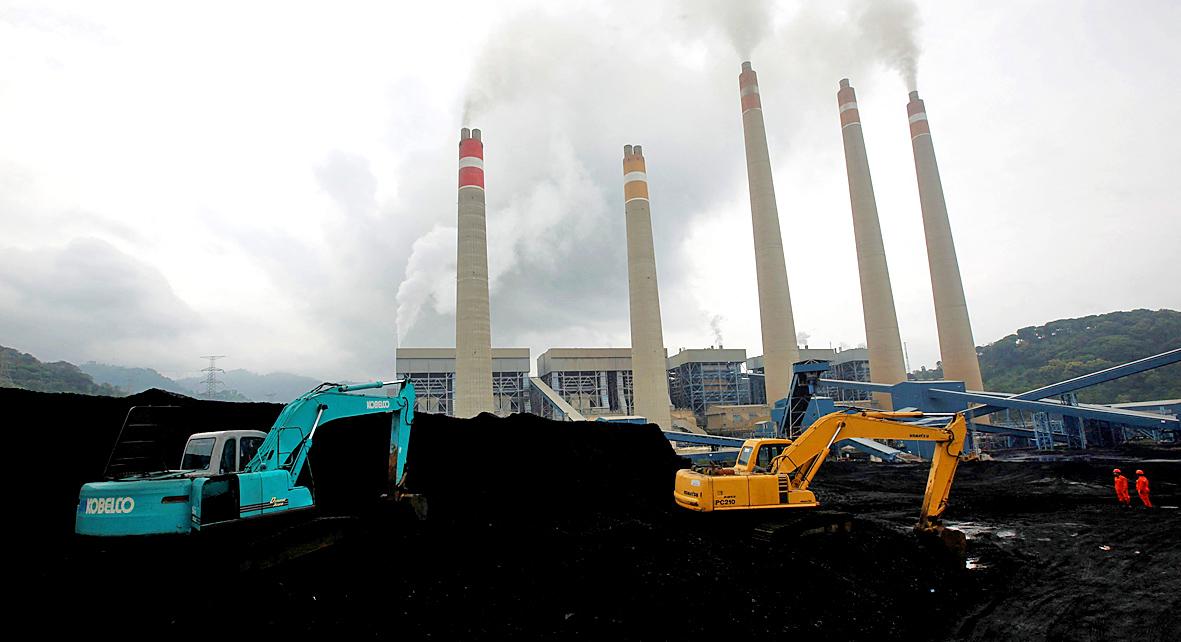Indonesia has warned that its coal supply situation remains critical ahead of a review today of its export ban, unnerving global markets for the fuel used to generate most of the electricity that drives Asia’s biggest economies.
Coal futures in China, the world’s biggest consumer of the fuel, surged yesterday after Indonesia, the top exporter of the coal used in power plants and China’s largest overseas supplier, on Saturday banned exports for January to avoid outages at the generators run by state-owned utility Perusahan Listrik Negara (PLN).
The price rise is among the first signs of the impact of Indonesia’s coal export ban, which threatens the energy security of some of the world’s biggest economies such as China, India, Japan and South Korea.

Photo: Reuters
China’s benchmark thermal coal futures rose by as much as 7.8 percent on the first day of trading since the policy was announced and were at 712.40 yuan (US$111.81) a tonne. That is the highest since Dec. 20 and futures are set for their biggest gain since Oct. 19.
Late on Monday, PLN said it has secured 3.2 million tonnes of coal out of the 5.1 million tonnes of additional supply for January that it needs to avoid widespread outages.
However, it warned that “this critical period is not yet over,” adding that it continued to coordinate with the Indonesian government and other coal suppliers.
At the same time, Indonesian President Joko Widodo said that coal miners, as well as liquefied natural gas producers, must prioritize domestic supply and ensure energy security in Indonesia before exporting.
He threatened to revoke the business permits of miners who failed to meet a so-called domestic market obligation that requires them to sell 25 percent of their coal output to the domestic market at a maximum price of US$70 per tonne.
Indonesian Minister of Finance Sri Mulyani Indrawati said that the ban was enacted to avoid disrupting the recovery of Indonesia’s economy, Southeast Asia’s biggest, from the COVID-19 pandemic.
However, the decision endangers Asia’s economic powerhouses China, India, Japan and South Korea, which together received 73 percent of Indonesian coal exports last year, shiptracking data from Kpler showed.
Indonesian authorities are set to re-examine the export ban today.
The logistics of rerouting coal cargoes to PLN’s power stations will be challenging, because it will require smaller barges rather than large carriers, a Singapore-based coal analyst said.
Indonesian Coal Miners’ Association chairman Pandu Sjahrirof said that as a “very short-term solution” the group’s 10 biggest members would help PLN close the supply gap.
Indonesian State-Owned Enterprises (SOE) Minister Erick Thohir said in a statement that his ministry is working to improve PLN’s coal supply management and infrastructure.
“We at the SOE Ministry will improve the long-term supply contracts,” Erick said, adding that the logistics system and infrastructure would also be upgraded to ensure domestic coal needs are met.
Analysts on Monday warned that India, which consumed more than 15 percent of Indonesia’s coal exports last year, might reroute shipments from other suppliers if the ban persists.
That could mean higher demand for coal from Australia, also a major supplier to Asia.
Shares of Whitehaven Coal jumped as much as 9.2 percent yesterday, the most since July 16.

Micron Memory Taiwan Co (台灣美光), a subsidiary of US memorychip maker Micron Technology Inc, has been granted a NT$4.7 billion (US$149.5 million) subsidy under the Ministry of Economic Affairs A+ Corporate Innovation and R&D Enhancement program, the ministry said yesterday. The US memorychip maker’s program aims to back the development of high-performance and high-bandwidth memory chips with a total budget of NT$11.75 billion, the ministry said. Aside from the government funding, Micron is to inject the remaining investment of NT$7.06 billion as the company applied to participate the government’s Global Innovation Partnership Program to deepen technology cooperation, a ministry official told the

Taiwan Semiconductor Manufacturing Co (TSMC, 台積電), the world’s leading advanced chipmaker, officially began volume production of its 2-nanometer chips in the fourth quarter of this year, according to a recent update on the company’s Web site. The low-key announcement confirms that TSMC, the go-to chipmaker for artificial intelligence (AI) hardware providers Nvidia Corp and iPhone maker Apple Inc, met its original roadmap for the next-generation technology. Production is currently centered at Fab 22 in Kaohsiung, utilizing the company’s first-generation nanosheet transistor technology. The new architecture achieves “full-node strides in performance and power consumption,” TSMC said. The company described the 2nm process as

Shares in Taiwan closed at a new high yesterday, the first trading day of the new year, as contract chipmaker Taiwan Semiconductor Manufacturing Co (TSMC, 台積電) continued to break records amid an artificial intelligence (AI) boom, dealers said. The TAIEX closed up 386.21 points, or 1.33 percent, at 29,349.81, with turnover totaling NT$648.844 billion (US$20.65 billion). “Judging from a stronger Taiwan dollar against the US dollar, I think foreign institutional investors returned from the holidays and brought funds into the local market,” Concord Securities Co (康和證券) analyst Kerry Huang (黃志祺) said. “Foreign investors just rebuilt their positions with TSMC as their top target,

POTENTIAL demand: Tesla’s chance of reclaiming its leadership in EVs seems uncertain, but breakthrough in full self-driving could help boost sales, an analyst said Chinese auto giant BYD Co (比亞迪) is poised to surpass Tesla Inc as the world’s biggest electric vehicle (EV) company in annual sales. The two groups are expected to soon publish their final figures for this year, and based on sales data so far this year, there is almost no chance the US company led by CEO Elon Musk would retain its leadership position. As of the end of last month, BYD, which also produces hybrid vehicles, had sold 2.07 million EVs. Tesla, for its part, had sold 1.22 million by the end of September. Tesla’s September figures included a one-time boost in